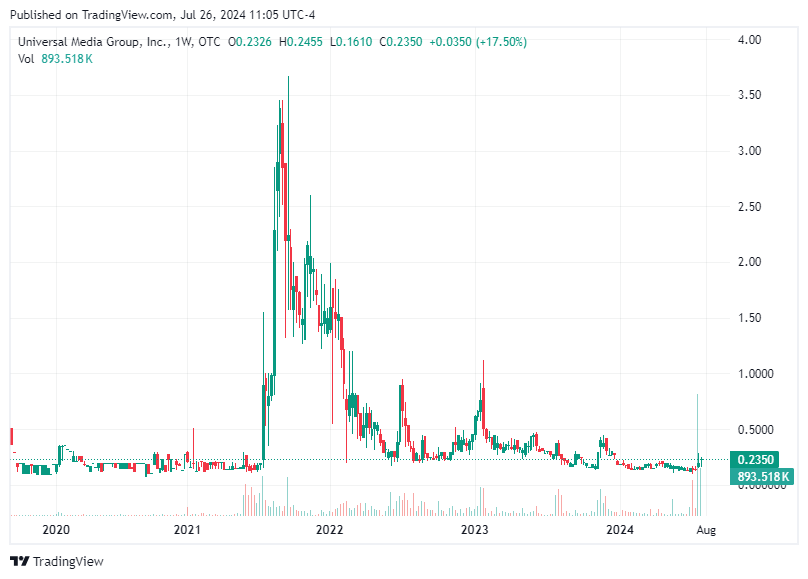Music Giant Reports $16 Billion Market Cap Decline
Universal Music Group Faces $16 Billion Market Cap Decline After Revenue Shortfall.

Disclaimer: The following article discusses recent financial developments involving Universal Music Group (UMG). All information presented is based on publicly available data as of July 2024. The content is intended solely for informational purposes and should not be construed as financial advice.
Real-time information is available daily at https://stockregion.net
Universal Music Group (UMG), the music giant housing artists such as Taylor Swift, Billie Eilish, and Ariana Grande, experienced a financial setback recently. The company witnessed a steep decline in its market capitalization, losing $16 billion following an announcement of lackluster revenue growth from subscription and streaming services that failed to meet analyst expectations. On the day of the announcement, UMG's stock plummeted by 24%, a stark reflection of investor sentiment reacting to the disappointing revenue figures.
Key Factors Behind the Revenue Miss
A major component contributing to this financial downturn was the deceleration in subscription revenue growth. For the second quarter, UMG reported a 6.9% year-over-year increase in subscription revenue, excluding foreign exchange effects. This was notably lower than the 12.5% growth observed in the first quarter, signaling a slowdown that caught the market off guard.
According to Boyd Muir, UMG's Vice President and Chief Financial Officer, this deceleration was partly due to the timing of price increases instituted by UMG’s streaming partners. These partners include industry leaders like Spotify, Amazon Music, and Apple Music. Muir elaborated that while the global subscription marketplace continues to grow robustly, certain platforms have struggled to maintain the same pace of subscriber additions. While giants like Spotify and YouTube showed healthy subscriber growth, other partners faced challenges in driving global adoption, resulting in slower subscriber growth and impacting UMG's subscription revenue.
In addition to the subscription revenue slowdown, UMG's streaming revenue also recorded a notable decline. The second quarter saw a 3.9% decrease in streaming revenue, excluding foreign exchange effects, a sharp contrast to the 10.3% growth reported in the first quarter. This decline was attributed to several factors, including a deceleration in growth at key advertising-based platform partners and shortfalls related to the timing of deal renewals.
One specific incident that exacerbated this situation was UMG's decision to end its partnership with Meta Platforms Inc. (META) in May. This partnership had involved the licensing of premium music videos for Facebook, and its termination led to a temporary loss of revenue. Additionally, UMG also lost a month’s worth of revenue during its highly publicized battle with TikTok over a new licensing agreement, further straining its quarterly results.
Internal Measures and Restructuring Plans
Despite these setbacks, UMG's total revenue rose for the twelfth consecutive quarter, reaching 2.93 billion euros ($3.18 billion), representing approximately 9% year-over-year growth, a figure that surpassed consensus estimates.
Earlier in the year, UMG initiated a comprehensive restructuring plan aimed at achieving 250 million euros in annual savings by 2026. This restructuring included measures such as job cuts, reflecting the company's proactive approach towards maintaining financial stability and efficiency. The broader music streaming industry continues to experience rapid growth, driven by increasing global adoption of digital music services. UMG, being one of the largest players in the industry, is influenced by trends and developments within this space.
The competition among streaming platforms remains intense, with major players like Spotify, Apple Music, and Amazon Music vying for market share. These platforms' performance directly impacts UMG’s revenue streams, given the intertwined nature of their business relationships. UMG's ability to navigate these challenges will be critical. The company must focus on strengthening its partnerships with key streaming platforms, exploring new revenue opportunities, and continuing its strategic restructuring efforts. Additionally, staying attuned to consumer preferences and technological advancements will be essential for sustaining growth in a dynamic and competitive industry.
The recent $16 billion decline in UMG's market cap following a revenue miss highlights the volatility and sensitivity of the music streaming industry to financial performance metrics. As UMG works through these challenges, its strategic decisions and ability to adapt will play a crucial role in shaping its future trajectory.
Disclaimer: This article provides an analysis of Universal Music Group's financial situation based on publicly available information as of July 2024. It is intended for informational purposes only and should not be considered financial advice.
Real-time information is available daily at https://stockregion.net




